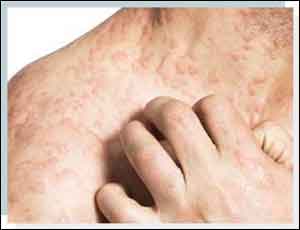- Home
- Editorial
- News
- Practice Guidelines
- Anesthesiology Guidelines
- Cancer Guidelines
- Cardiac Sciences Guidelines
- Critical Care Guidelines
- Dentistry Guidelines
- Dermatology Guidelines
- Diabetes and Endo Guidelines
- Diagnostics Guidelines
- ENT Guidelines
- Featured Practice Guidelines
- Gastroenterology Guidelines
- Geriatrics Guidelines
- Medicine Guidelines
- Nephrology Guidelines
- Neurosciences Guidelines
- Obs and Gynae Guidelines
- Ophthalmology Guidelines
- Orthopaedics Guidelines
- Paediatrics Guidelines
- Psychiatry Guidelines
- Pulmonology Guidelines
- Radiology Guidelines
- Surgery Guidelines
- Urology Guidelines
Researchers develop a safer treatment option of allergic contact dermatitis

Allergic contact dermatitis is usually caused by exposure to an allergen in sensitive people.The symptoms are reduced by removal of the sensitizing allergens which include nickel and gold, perfumes, soaps or organic compounds.but recovery may take weeks.Dr.Nicolas Bazan, Professor, and Director at LSU Health New Orleans School of Medicine and colleagues have discovered a promising new treatment for allergic contact dermatitis that offers an alternative to corticosteroids and their possible side effects.The findings of the research have been published in Dermatology and Therapy, available here.
One of the current primary treatments for severe allergic contact dermatitis is the use of corticosteroids. Long-term use of corticosteroids can result in skin atrophy, spider veins, loss of skin color or corticosteroid acne. They can disrupt the skin's barrier and lead to adrenal suppression, altered growth, hypertension, hyperglycemia, insulin resistance and cataracts, and they may increase the risk for certain cancers.
The research team developed a mixture of antioxidants and moisturizers, combined with potent free radical scavengers and inhibitors, which suppressed an inflammatory response to the irritant. The cream relieved itch, reduced swelling and protected peripheral nerves in the affected area.
The experimental cream, on the other hand, successfully treated allergic contact dermatitis in mice, without the side effects of corticosteroids. The new cream works in a different way by preventing or stopping the process that initiates inflammation.
This project is part of a long collaboration that Dr. Bazan developed with Dr. Ricardo Palacios-Pelaez from Spain on inflammation, immunity and neurodegenerative diseases.
"Now with the new cream, we targeted some of those mechanisms in a relatively less complex condition in the skin, always with translational-enabling goals," said Bazan.
Other members of the research team included Drs. William Gordon, Surjyadipta Bhattacharjee and Bokkyoo Jun at LSU Health New Orleans Neuroscience Center of Excellence, as well as Drs. Virginia Garciá López, David Rodríguez Gil, Javier Alcover Díaz, Fernando Pineda de la Losa, Ricardo Palacios Peláez, Concha Tiana Ferrer and Gabriela Silvina Bacchini from Madrid, Spain; along with Hélène Varoqui at Ochsner.
"While our results are very promising, additional studies are needed to determine the ideal duration of treatment and the most efficacious concentrations of the active components in the test formulations that will best alleviate ACD," Bazan concluded.
The research was supported by a grant from the National Institute of General Medical Sciences, as well as LSU Health New Orleans Neuroscience Center of Excellence.
This work is part of Bazan's innovative research searching for novel fundamental principles of tissue/organ injury involving inflammation, immunology, genetics and epigenetics. Most of his efforts are focused on responses to damage to the brain and retina and include Parkinson's, Alzheimer's, pain, Macular degeneration and traumatic brain injury, but as these findings demonstrate, fundamental discoveries have broad application.
For more details click on the link: Dermatology and Therapy, 2018; 8 (1): 111 DOI: 10.1007/s13555-018-0223-8

Disclaimer: This site is primarily intended for healthcare professionals. Any content/information on this website does not replace the advice of medical and/or health professionals and should not be construed as medical/diagnostic advice/endorsement or prescription. Use of this site is subject to our terms of use, privacy policy, advertisement policy. © 2020 Minerva Medical Treatment Pvt Ltd